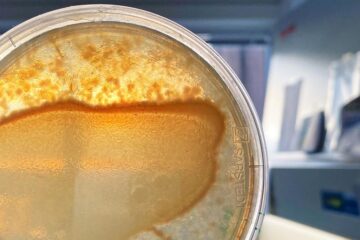ECO-PESED – Efficient and codon optimized protein expression, secretion and detection system for the green microalga Chlamydomon

The wide use of recombinant polypeptides is limited by still insufficient means of production, namely, their expression in host cells. The most often used bacterial host cells generally have the considerable drawback that polypeptides of eukaryotic origin are not folded correctly and that undesirable posttranslational modifications may occur. One of the most severe drawbacks is that the target polypeptide is typically located in the cytoplasm of the host cells and must be isolated from said cytoplasm in a laborious, time-consuming and expensive downstream-processing.
In view of the above, an expression system is needed that is usable in an eukaryotic cell extensively autologous with respect to sugars, amino acids and that is extensively independent of growth factors. It has been shown that plant cells, in particular microalgae cells, can be used for the production of recombinant proteins and overcome most of the above problems. Microalga cultures are comparably easy to handle and, in principle, scalable to large production scales. Furthermore, microalgae merely require a slightly salty aqueous environment, CO2 and light, can be supplemented by simple carbon sources, or a combination of these strategies to grow rapidly and produce the recombinant protein of interest. Therefore, the cultivation of microalgae is relatively inexpensive. These cultures can be extensively free of sugars and amino acids. The use of solar energy to produce biomass and recombinant protein production is an attractive aspect of these cells in light of the goal of sustainability. Unfortunately, the efficient production of recombinant proteins in microalgae is hampered because of the tightly regulated gene expression, preference for certain nucleic acid codon usage, and bias to its own promoters. The present invention allows to overcome these problems with highly efficient production and direct secretion of target polypeptides into the medium and in addition enables simultaneous monitoring of the polypeptide production without disturbing the expression system. This system has in principle a large range of applications and may be used due to the safe organism for researchers, pharmaceutical targets and food and feed producers.
Weitere Informationen: PDF
PROvendis GmbH
Tel.: +49 (0)208/94105 10
Ansprechpartner
Dipl.-Ing. Alfred Schillert
Media Contact
Alle Nachrichten aus der Kategorie: Technologieangebote
Neueste Beiträge

Das Mikrobiom verändert sich dynamisch und begünstigt wichtige Funktionen für den Wirt
Ein interdisziplinäres Forschungsteam des Kieler SFB 1182 untersucht am Beispiel von Fadenwürmern, welche Prozesse die Zusammensetzung des Mikrobioms in Wirtslebewesen steuern. Alle vielzelligen Lebewesen – von den einfachsten tierischen und…

Wasser im Boden – genaue Daten für Landwirtschaft und Klimaforschung
Die PTB präsentiert auf der Woche der Umwelt, wie sich die Bodenfeuchte mithilfe von Neutronenstrahlung messen lässt. Die Bodenfeuchte hat nicht nur Auswirkungen auf die Landwirtschaft, sondern ist als Teil…

Bioreaktor- und Kryotechnologien für bessere Wirkstofftests mit humanen Zellkulturen
Medizinische Wirkstoffforschung… Viele Neuentwicklungen von medizinischen Wirkstoffen scheitern, weil trotz erfolgreicher Labortests mit Zellkulturen starke Nebenwirkungen bei Probanden auftreten. Dies kann passieren, wenn zum Beispiel die verwendeten Zellen aus tierischem…

















